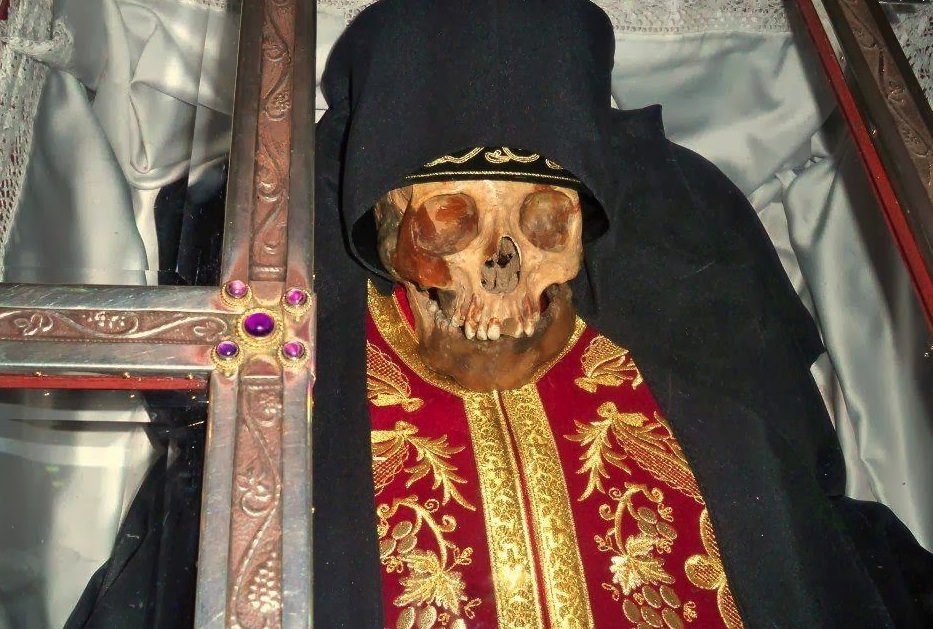Recently, there has been a dispute between truth brought forth by RC of Pulpit & Pen and people blinded by the traditions of Eastern Orthodoxy. In a response to RC’ post about his visit to Hank Hanegraaff’s new EO church in Charlotte, NC, a person who goes by the name Maximus Confesses on the blog site Medium.com, wrote this paragraph at the end:
He [Jeff] claims, “In this religion, salvation doesn’t come through Christ’s imputed righteousness and substitutionary atonement on the cross, it comes through these dead rituals that they believe ontologically changes them into divine beings.” First of all, the claim that Christ’s death is “imputed” is basically immoral, it makes no sense to say an innocent can be punished for the evils of someone else. Rather, Christ by infusing his life, death and resurrections into us, making his work our works, makes far more sense, as justice and holiness are real properties that exist. (emphasis mine)
Essentially, he denies Penal Substitutionary Atonement and that God imputed our sins onto Christ so Christ’s righteousness could be imputed onto us, cleansing us of our sin so that we could be in the presence of the Father. Note, he does not use scripture to support his claim, it is his personal opinion that is his authority. This is the definition Penal Substitutionary Atonement from Theopedia.com:
Penal substitutionary atonement refers to the doctrine that Christ died on the cross as a substitute for sinners. God imputed the guilt of our sins to Christ, and he, in our place, bore the punishment that we deserve. This was a full payment for sins, which satisfied both the wrath and the righteousness of God, so that He could forgive sinners without compromising His own holy standard.
Now I could quote theologians who have written volumes on the subject but the Eastern Orthodox people would not accept their interpretation any more than we accept their quotes from theologians supporting their unbiblical practices of icons, rote pageantry, and everything else. Instead, I will quote verses from the bible that should be very self-explanatory in support of imputation, which will also demonstrate their denial of sola scriptura and sola fide.
Christ became sin on our behalf:
21 For our sake he made him to be sin who knew no sin, so that in him we might become the righteousness of God. –2 Corinthians 5:21
By Christ’s shed blood we are justified, not Christ’s works:
21 But now the righteousness of God has been manifested apart from the law, although the Law and the Prophets bear witness to it— 22 the righteousness of God through faith in Jesus Christ for all who believe. For there is no distinction: 23 for all have sinned and fall short of the glory of God, 24 and are justified by his grace as a gift, through the redemption that is in Christ Jesus, 25 whom God put forward as a propitiation (Propitiation means the turning away of wrath by an offering. In relation to soteriology, propitiation means placating or satisfying the wrath of God by the atoning sacrifice of Christ) by his blood, to be received by faith. This was to show God’s righteousness, because in his divine forbearance he had passed over former sins. 26 It was to show his righteousness at the present time, so that he might be just and the justifier of the one who has faith in Jesus. –-Romans 3:21-26
Abraham was saved by faith, not works, by looking forward to Christ:
20 No unbelief made him waver concerning the promise of God, but he grew strong in his faith as he gave glory to God, 21 fully convinced that God was able to do what he had promised. 22 That is why his faith was “counted to him as righteousness.” 23 But the words “it was counted to him” were not written for his sake alone, 24 but for ours also. It will be counted to us who believe in him who raised from the dead Jesus our Lord, 25 who was delivered up for our trespasses and raised for our justification. –Romans 4:20-25
Christ died for the ungodly, namely us:
6 For while we were still weak, at the right time Christ died for the ungodly. 7 For one will scarcely die for a righteous person—though perhaps for a good person one would dare even to die— 8 but God shows his love for us in that while we were still sinners, Christ died for us. 9 Since, therefore, we have now been justified by his blood, much more shall we be saved by him from the wrath of God. 10 For if while we were enemies we were reconciled to God by the death of his Son, much more, now that we are reconciled, shall we be saved by his life. 11 More than that, we also rejoice in God through our Lord Jesus Christ, through whom we have now received reconciliation. –Romans 5:6-11
Christ laid down His life for His sheep, not His works:
11 I am the good shepherd. The good shepherd lays down his life for the sheep. –John 10:11
Righteousness is not through works. Christ perfectly obeyed the law on our behalf so He could be God the Father’s perfect Lamb on our behalf:
19 For through the law I died to the law, so that I might live to God. 20 I have been crucified with Christ. It is no longer I who live, but Christ who lives in me. And the life I now live in the flesh I live by faith in the Son of God, who loved me and gave himself for me. 21 I do not nullify the grace of God, for if righteousness[c] were through the law, then Christ died for no purpose. –Galatians 2:19-21
Again, we are reconciled by Christ’s blood, not His works:
12 remember that you were at that time separated from Christ, alienated from the commonwealth of Israel and strangers to the covenants of promise, having no hope and without God in the world. 13 But now in Christ Jesus you who once were far off have been brought near by the blood of Christ. –Ephesians2:12-13 (read the whole chapter to get the whole picture)
There are a lot more passages I am sure I could quote but this should be sufficient to fully explain through scripture that our sin was imputed onto Christ who bore the Father’s wrath meant for us, whose shed blood reconciled us to the Father, and Christ’s righteousness in now imputed onto the elect. Our works through observances, rituals or traditions amount to nothing (Philippians 3:2-11).
[Contributed by Michael Hall]












